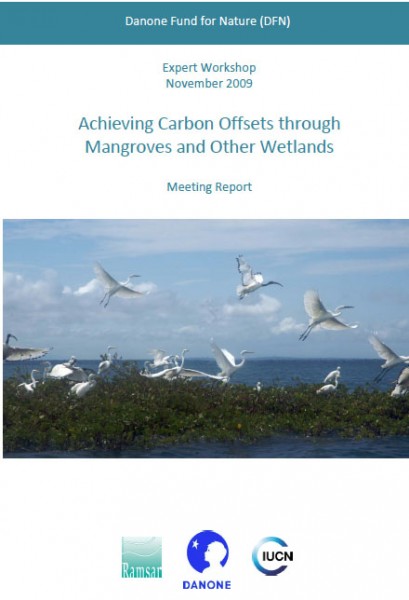8 June 2010: The Ramsar Secretariat has released the report of the expert workshop “Achieving Carbon Offsets through Mangroves and Other Wetlands,” which convened in Gland, Switzerland, in November 2009.
The workshop was organized under the “Danone Fund for Nature” (DFN) partnership between the Danone Group, IUCN and the Ramsar Convention.
It brought together those […]
 8 June 2010: The Ramsar Secretariat has released the report of the expert workshop “Achieving Carbon Offsets through Mangroves and Other Wetlands,” which convened in Gland, Switzerland, in November 2009.
8 June 2010: The Ramsar Secretariat has released the report of the expert workshop “Achieving Carbon Offsets through Mangroves and Other Wetlands,” which convened in Gland, Switzerland, in November 2009.
The workshop was organized under the “Danone Fund for Nature” (DFN) partnership between the Danone Group, IUCN and the Ramsar Convention. It brought together those directly involved in the implementation of the Danone Fund for Nature with a wider group of experts from other organizations, including Ramsar’s Scientific and Technical Review Panel (STRP), with expertise in one or more aspects of mangrove restoration, wetland restoration, carbon measurement (in mangroves and other types of wetland), and carbon offsets and markets. Participants reviewed and advised on the further development of the Danone/IUCN/Ramsar initiative in the context of other wetland-related carbon storage and offsets initiatives and projects, and with a particular focus on mangroves.
The outputs from the workshop will be relevant not only to the further implementation of the DFN, but also to the work of other organizations and processes addressing issues of carbon and wetlands.
The final report includes workshop conclusions and recommendations for further work on: establishing small-scale and large-scale carbon offset certification methodologies for mangroves; elaborating the DFN restoration project guidance documentation for carbon projects; and identifying the main opportunities for reconciling wetland carbon offsets and social development in different types of both coastal and inland wetlands. The report also includes a baseline and monitoring methodology for carbon restoration project activities implemented on wetlands such as mangroves, and a qualitative decision support tool matrix for carbon offset potential in different wetland types, developed during the workshop. [The Report]